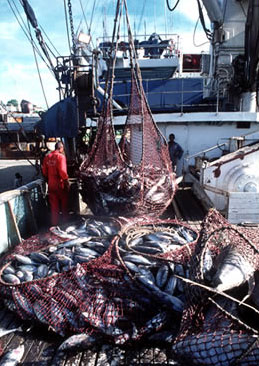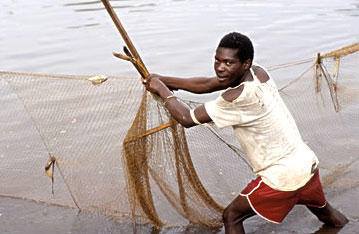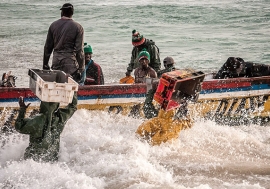Safeguarding Africa’s fishing waters
 Foreign ships, such as this tuna trawler, haul huge quantities of fish out of African waters, but African countries need more capacity to ensure their catches stay within negotiated limits.
Foreign ships, such as this tuna trawler, haul huge quantities of fish out of African waters, but African countries need more capacity to ensure their catches stay within negotiated limits.Every day hundreds of unlicensed fishing vessels enter African waters and trawl for shrimp, sardines, tuna, and mackerel. According to a study commissioned by the UK’s aid agency, such trawlers are costing Africa some $1 bn every year. But illegal fishing “is not just an African problem,” says Arona Soumare, the West Africa conservation director for the World Wildlife Fund (WWF). Many countries, even developed states with substantial marine security forces, struggle to keep unlicensed fishing vessels from their waters.
However, Mr. Soumare notes, in comparison to developed countries, “the social and economic impact of such losses on Africa are huge.” The funds that African countries lose to illegal fishing are “a potential source of income” that they “can ill afford to be without.”
In theory, Africa’s fishing waters should be protected under international law. In 1982 the International Law of the Sea set a 200-mile zone off the shores of coastal states within which fishing and other natural resource exploitation cannot take place without a licence. But African countries’ efforts to stop illegal fishing within those limits are hampered by a lack both of expertise and of the vast resources needed for policing such wide maritime areas. Only a few African countries, such as Namibia and South Africa, have the capacity to patrol their waters sufficiently to keep away illegal vessels, says Sloans Chimatiro, senior fisheries adviser at the secretariat of the New Partnership for Africa’s Development (NEPAD), adopted by African leaders in 2001.
Licensed vessels are required by a variety of national and international agreements to adhere to certain fishing quotas and keep away from protected areas. Fleets are also prohibited from using long trawling fishing nets. Such nets catch everything within their reach, and the excess or unwanted types of fish are simply discarded, a process that contributes to depleting natural fish stocks. Nets with small meshes are also a problem, since they catch very young fish.
To ensure that fishing fleets adhere to all the rules, governments require patrol boats, aerial surveillance and monitoring systems, says Andre Standing, a senior researcher at the South African Institute of Security Studies. Governments also need to invest in training law enforcement staff, put in place proper investigation procedures, audit fish stocks and create sustainable fisheries programmes. “In most African countries,” says Mr. Standing, “these are not in place and the necessary funding and expertise to create them is not readily available.”
 Senegalese fishing boat: Regional coordination is essential to safeguard Africa’s endangered fisheries.
Senegalese fishing boat: Regional coordination is essential to safeguard Africa’s endangered fisheries.The solution, regional experts suggest, lies in improved coordination and cooperation among governments, especially in sharing information and equipment such as patrol boats. “No one single country can effectively guard its territorial waters without working together with others,” asserts Mr. Chimatiro. Towards that end, NEPAD and its partners, including the UK’s Department for International Development (DfID) and the non-profit group Stop Illegal Fishing, are working with African governments to improve collaboration and the sharing of information and resources.
Livelihoods threatened
The costs of illegal fishing in Africa are immense. A 2005 report commissioned by DfID found that illegal fishing of sardines and mackerel costs Angola about $49 mn annually, about 20 per cent of the country’s total income from fish exports. In 2005 alone, war-torn and impoverished Somalia lost an estimated $94 mn of potential revenue through the illegal fishing of shrimp and tuna off its waters. Guinea, Liberia and Sierra Leone are losing some $140 mn a year, and Mozambique loses about $38 mn.
 Checking a fishing net in Uganda: The livelihoods of millions of Africans are threatened by the depletion of the continent’s fish stocks.
Checking a fishing net in Uganda: The livelihoods of millions of Africans are threatened by the depletion of the continent’s fish stocks.Such figures fail to show the long-term losses. These include damage to marine environments, because “trawls are not good for the ecosystems, they damage habitat” of the fish, says Mamadou Diallo, programme manager in WWF’s West Africa office. Another cost, he says, is pollution, “because they are discharging [waste] at sea, where they can do anything they want.”
Since fishing contributes to African livelihoods, there is also a social impact. According to the WWF, fisheries “make a vital contribution to the food and nutritional security of over 200 million Africans and provide income for over 10 million, mostly small-scale fishers … and entrepreneurs.” A 2005 study by the West Africa Sustainable Seafood Development Alliance, a network of fishing professionals, donors and others, found that some 5.6 mn jobs in West Africa were fisheries-related, while export revenues from fish products from the region stood at $711 mn. For Africa as a whole, fish and fish products contribute an average annual export value of $2.7 bn.
Despite the significant role of fisheries, African governments have invested few resources in protecting and managing them. Tim Bostock, a DfID fisheries programme coordinator, told Africa Renewal that fisheries have traditionally ranked “very low on people’s political radar worldwide,” contributing “to the problems we see today.” However, he adds, the 2005 DfID study has to some extent helped raise the profile of fisheries. “Looking at finances and the money being lost has definitely helped garner the attention of politicians.”
Declining fish stocks
Considerable damage has already been done, however. Africa’s fish stocks have been declining rapidly, both because of trawling and because of unregulated and excessive fishing by local fisherfolk and legal commercial fleets. “Many stocks have already collapsed and others will gradually follow,” says Daniel Pauly, a fisheries biologist at Canada’s University of British Columbia.
International agreements require governments to work together to protect highly migratory fish such as tuna. But implementation has proved challenging and such species are being depleted by excessive deep-sea fishing. In addition, coastal areas, including mangrove forests where non-migratory species spawn, are being lost to farming and pollution. “This is not a sudden thing,” Mr. Pauly notes, “but a slow grinding down of one stock after another.”
Regional coordination needed
Mr. Standing points out that effectively combating illegal and unregulated fishing requires that countries share expertise and information, so that fleets forced away from the waters of one country cannot simply move to a neighbouring area.
There are organizations that seek to provide coordination. The Sub-regional Fisheries Commission (SFRC), based in Dakar, Senegal, serves as a platform for cooperation on fisheries issues for Cape Verde, Gambia, Guinea, Guinea-Bissau, Mauritania, Senegal and Sierra Leone. The Committee for the Eastern Central Atlantic Fisheries (CECAF) is supposed to play a similar role. “But CECAF has no regulatory powers and the SFRC has a limited geographical scope,” Mr. Soumare told Africa Renewal.
Similarly, there is a West African Sub-regional Fisheries Commission that has a “regional mandate to harmonize fisheries policies.” But it is not yet fully operational, Mr. Soumare concedes. Adds Mr. Standing: “African inter-governmental organizations that have a mandate to combat illegal fishing appear to be chronically underfunded and inefficient.”
Linking up coast guards
In response to the need for better coordination, the International Maritime Organization (IMO) in 2007 created a network through which 24 African states along the continent’s western coast can link up with maritime security agencies, non-African navies, insurers, Interpol and various UN agencies working on fisheries and security.
According to IMO Maritime Security Chief Chris Trelawny, if African states “tightened the net” around illegal fishing, they could earn more from licenses and thus in turn pay for better surveillance of ports and seas. Mr. Bostock agrees. “If that wealth can be channelled to better policing and if you have presence with assets such as patrol boats in strategic areas where fish are trawled, then the surveillance can be quite effective. It doesn’t cost that much relative to the fisheries’ value.”
DfID has been funding the development of a similar regional approach among countries of the Southern African Development Community (SADC). In July 2008, SADC’s fisheries ministers endorsed a regional strategy to improve monitoring and surveillance. Since the agreement was signed, South Africa, Mozambique and Namibia have mounted joint patrols and stopped a significant number of ships.
“The number of foreign fleets arrested has indeed risen,” says Mr. Chimatiro of the NEPAD Secretariat. However, he points out, “the scale of illegal fishing is just too huge and overwhelming for African countries to cope.” Africa will not be able to address this problem, he says, without the support of fleet-owning countries and “flag states” — countries that register ships.
Sandy Davies, a fisheries consultant and coordinator with the Stop Illegal Fishing campaign, agrees that flag states need to do more to ensure that ships they register obey international agreements, such as those prohibiting ships registered as cargo vessels from fishing. “Enforcement works quite well if the flag state is responsible,” she told Africa Renewal. “But there are many countries out there that simply do nothing to enforce the law. Fleets know this and therefore fly the flags of non-compliant states.”
Strengthening governance
Better equipment, information and cooperation may not, by themselves, be enough. Mr. Standing notes a clear link between poor governance and illegal fishing. “Countries where corruption and rent-seeking is endemic are particularly ineffective at combating criminal activities,” he says. That is because politicians and public officials may be “complicit in crimes” and weak legal systems cannot “administer effective justice.”
Ms. Davies agrees that better cooperation and resources will not be of much use “if you do not have the political will to put the common good ahead of personal gain.” Even with the right infrastructure in place, governments can sign fishing agreements that skirt the law, the owners of fishing vessels can pay kickbacks and port officials can turn a blind eye to illegal operators. Governments, she asserts, have to say: “‘We intend to follow through with the policies we have committed to,’ and individuals in the system have to decide that they are going to enforce the laws.”
Better contracts
Illegal fishing is not the only threat to African fish stocks. Even legal fishing, if not adequately controlled, poses a long-term threat. As early as 2002, the WWF warned that half of West Africa’s stocks of deep-sea fish had already disappeared. But many cash-strapped governments continue to issue poorly monitored licenses in the hope of raising revenues.
Mr. Soumare argues that in order to use their fisheries more sustainably, African countries will need political will, good data from fish audits, “proper scientific advice and a mechanism of sharing data and information among themselves in a timely manner.” Already, he notes, governments and environmental experts are working together more to get better fishing agreements.
Senegal’s multiyear fishing licence with the European Union (EU), on which the WWF advised the Senegalese government, is an example of a better contract. That contract, Dr. Soumare explains, prohibits EU vessels from fishing in certain areas and allocates funds to support local small-scale fisheries. It specifies “rest” periods in which there can be no fishing, sets limits to the size of catches, stipulates larger net meshes to reduce catches of undersized fish and permits Senegalese and international observers on EU fishing vessels. However, Mr. Soumare admits, while the agreement is better than previous ones, it is not effectively enforced and fails to allow the fish populations in Senegal’s waters to recover.
Enforcing legal contracts is not easy, Mr. Bostock observes. “We know that European, Chinese and other legal-distance fishing fleets probably overfish and underreport,” he told Africa Renewal. “But we have tremendous difficulty in monitoring this.”
Experts agree that one solution is to have independent observers on board fishing vessels. So far, observer programmes in Africa have had mixed results. “Quite a few never got off the ground, mostly because of a lack of political commitment,” says Ms. Davies. But she cites an exception. In Namibia a programme for onboard observers benefited from long-term government commitment and support from Norway’s aid agency. For over 15 years, Norway provided financing and experts to help develop the sector, train fisheries administrators and set up monitoring mechanisms. Such prolonged commitment by African governments and aid agencies is crucial, says Ms. Davies, because “the right skills, systems and capacities take a long time to develop.”
Donor support appears to be growing. In 2006, donors pledged a total of $240 mn for monitoring and surveillance of fisheries across Africa. In 2008, DfID approved £6 mn for a five-year Partnership for Africa Fisheries programme, to be coordinated by the NEPAD Secretariat. The programme aims to bring governments, civil society groups and private fishing companies together to find ways to better manage fisheries and prevent illegal fishing. While such projects provide a promising start, much more will be needed to help safeguard the livelihoods that depend on Africa’s coastal waters.















